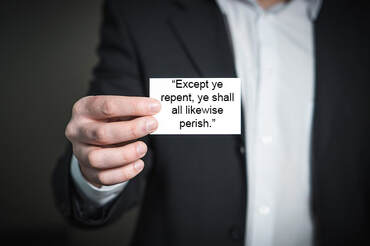|
I was privileged to grow up under the ministry of probably the greatest visionary I have ever personally known. His name was Dr. Bradley Price, and he came to Northside Baptist in Charlotte in 1990. The Charlotte Observer reported on our big days at Northside, where 8,000 people would gather for the Spirit of Christmas service and receive a hot-cooked free meal. Through my experiences with Dr. Price as a child, a youth, one called to ministry, and then a ministry intern, glory to God, I caught from him the passion for and ability to dream, to crystallize a vision, and to inspire others to see the dream also.
I just sort of thought everyone had that same passion and ability. One day, I was sitting in a circle of pastors, and we were picking each other's brains for ideas and supporting one another in prayer. One of my pastoral brothers asked, "Can anyone help me develop a vision for my church? I've never been taught how to do that." If a pink elephant had jumped up on the desk, I may not have been more surprised. I just thought everyone knew this. Over the years, I have come to learn that the ability to "see" a vision for an organization, for a church, for a people, for a community and region, is something that is caught. Sure, you can go out and buy Andy Stanley's book and others, but translating principles into practice is easier said than done. Therefore, when it comes to recruiting and identifying leaders, and also hiring staff, look for those who demonstrate the ability to dream, to cast vision, and to build consensus around the dream. I'm blessed that my Assistant Pastor has this ability, and, Lord willing, the successful candidate for the next pastoral position we fill will have it also. Not long ago, I was speaking with a minister whose organization is thinking about buying our church property which is for sale. As we talked together, it struck me. This man has the ability to develop a vision. It had been a long while since I had talked with someone in ministry with that ability, and it was so refreshing. Such people are cut out of a little bit different cloth, it seems. And if you have this ability, mentor others, so that they can catch it also.
0 Comments
 You can find armchair quarterbacks in our day who bemoan the fact that not every preacher on the planet is a doomsday prophet or that not every preacher dwells on positive-only feel-good preaching. In the Bible, God called and used a variety of different personalities to speak to His people, and it should not surprise us that He does the same today. Popularly, Jeremiah is called the Weeping Prophet. On the other hand, Jesus named James and John the Sons of Thunder. When Jesus asked Peter, “Whom do men say that I the Son of Man am?” the responses reflect the many different sides of Jesus’ personality and different ways in which His ministry had touched different people. Nineteenth Century preaching legend Phillips Brooks spoke of “truth through personality.” Stephen Olford and others emphasized the need for “incarnational preaching” - the life lived out by the preacher supports and continues declaring his message. Erik Rees’ S.H.A.P.E. helpfully noted that God doesn’t just use a person’s spiritual gives (S.) but also his Heart, Abilities, Personality, and Experience - all of which God gives to or allows for the individual. To sum it up, we should not be surprised to find variety among the voices God calls to proclaim His truth. What tied all of the Scriptural examples together and validated their preaching was that all of them declared only the message that God had given to them. They were His mouthpieces. They did not invent their messages or monkey with God’s revelation. They declared, best they knew how, what He had insisted they proclaim using the minds, personalities, and resources available to them. The result was a broad variety of emotions - a similar reality in our day also. One of the main categories of blog posts I intend to create here is a “week in the life of a pastor.” Ministry rides that strange line between the necessity of planning ahead and days that can be full of surprises. For those who sense a call into ministry, a helpful way to give you a taste of things is for you to experience it as I experience it. It’s as close to shadowing as we can get via Internet. I had hoped to do this through video, but I came down with some head congestion, which would make it difficult for you to understand me. And I had to save my voice for the weekend. So, here is my Week in Review for last week. Stay tuned for video content
 Whenever I speak as a guest, one of the first things I do after giving my name and thanking my hosts for having me is to tell my salvation testimony. Before anyone stands before an audience and opens the Word of God, it is my belief that the presenter should offer his salvation testimony. As pastors, shepherds of God's flock, overseers of Christ's body, it is vital that our people hear regularly our testimony of how Christ saved our souls. And here are a few of the results you can expect.  Some denominations have a guaranteed appointment system, and some pastors are moved around by a district-level bishop. Baptist pastors, however, usually apply independently for a vacant role (or are approached out of the blue) and "candidate" for a position. There is often a questionnaire, an interview, a trial sermon, and a vote. A commonly asked question has to do with what sort of percentage a pastoral candidate should seek before accepting a call from a church. Ideally, the vote would be unanimous, right? But that isn't all that common. Is it biblical to draw a line in the sand? How do you even think about this issue? Does it just boil down to a coin toss? |
AuthorPastor Billy Shaw is a full-time pastor, husband, and father with a passion for helping other pastors. Archives
August 2020
Categories
All
|
 RSS Feed
RSS Feed